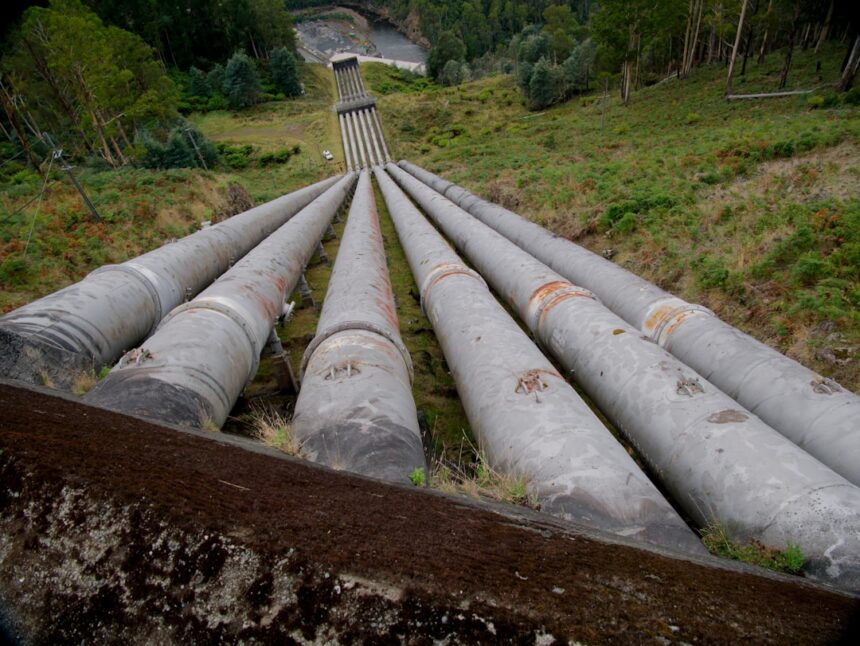The Nord Stream project, a monumental undertaking in the realm of energy infrastructure, traces its origins back to the early 2000s. The initiative was born out of a necessity to secure a stable and reliable supply of natural gas from Russia to Europe, particularly in light of the increasing energy demands of European nations. The project was spearheaded by Gazprom, the Russian state-owned gas company, in collaboration with several European energy firms.
The first phase of the pipeline, which runs under the Baltic Sea, was officially inaugurated in 2011, marking a significant milestone in energy transportation. The conception of Nord Stream was not merely a response to market demands; it was also a strategic maneuver in the context of European energy security. As Europe sought to diversify its energy sources and reduce dependency on traditional transit countries like Ukraine, the idea of a direct pipeline from Russia to Germany emerged as an attractive solution.
This ambitious project aimed to facilitate the transportation of natural gas directly to the heart of Europe, thereby bypassing potential geopolitical tensions that could disrupt supply routes.
Key Takeaways
- Nord Stream is a natural gas pipeline that runs from Russia to Germany, with a history dating back to the early 2000s.
- The project has significant geopolitical implications, as it bypasses traditional transit countries and has the potential to increase Europe’s energy dependence on Russia.
- Nord Stream has had a major impact on European energy markets, providing a new route for Russian gas to reach the continent and potentially affecting prices and competition.
- Environmental concerns surrounding Nord Stream include potential damage to marine ecosystems and the impact of construction on local habitats.
- Russia plays a central role in the Nord Stream project, as the majority shareholder in the pipeline and a key player in European energy politics.
The Geopolitical Implications of Nord Stream
The geopolitical landscape surrounding Nord Stream is complex and multifaceted, reflecting the intricate relationships between Russia, Europe, and other global powers. The pipeline has been viewed as a tool for Russia to exert influence over European energy markets, allowing it to strengthen its position as a key supplier while simultaneously diminishing the role of transit countries like Ukraine. This shift has raised concerns among European nations about their energy security and the potential for increased Russian leverage in political negotiations.
Moreover, Nord Stream has implications that extend beyond Europe. The project has drawn the attention of the United States, which has historically been wary of Russian expansionism and its impact on global energy dynamics. Washington has expressed strong opposition to Nord Stream, arguing that it undermines European energy independence and increases reliance on Russian gas.
This opposition has manifested in various forms, including sanctions against companies involved in the project and diplomatic efforts to dissuade European nations from participating. As such, Nord Stream has become a focal point in the broader geopolitical struggle between Russia and Western powers.
The Economic Impact of Nord Stream on European Energy Markets

The economic ramifications of Nord Stream on European energy markets are profound and far-reaching. By providing a direct route for Russian natural gas to reach Germany and other European countries, the pipeline has significantly altered the dynamics of energy supply and demand within the region. The increased availability of natural gas has contributed to lower prices for consumers and businesses alike, fostering economic growth and stability in several member states.
However, this economic benefit comes with caveats. Critics argue that reliance on Russian gas through Nord Stream could lead to vulnerabilities in energy supply chains, particularly in times of geopolitical tension. The potential for price manipulation or supply disruptions raises questions about long-term sustainability and energy independence for European nations.
As countries grapple with these challenges, they must also consider the implications for their domestic energy policies and strategies for diversification.
The Environmental Concerns Surrounding Nord Stream
| Environmental Concerns | Description |
|---|---|
| Impact on Marine Life | The construction and operation of Nord Stream may disrupt marine habitats and affect the behavior of marine species. |
| Water Quality | There are concerns about potential water pollution from construction activities and the possibility of leaks or spills during operation. |
| Carbon Emissions | The extraction and transportation of natural gas through Nord Stream contribute to greenhouse gas emissions, impacting climate change. |
| Seabed Disturbance | The laying of pipelines and infrastructure may disturb the seabed, affecting benthic ecosystems and sediment stability. |
Environmental concerns surrounding the Nord Stream project have been a significant point of contention since its inception. The construction and operation of the pipeline have raised alarms among environmentalists and local communities about potential ecological damage to marine ecosystems in the Baltic Sea. Critics argue that the disruption caused by construction activities could harm sensitive habitats and threaten biodiversity in the region.
Furthermore, there are broader concerns about the environmental impact of increased fossil fuel consumption associated with Nord Stream. As Europe strives to transition towards renewable energy sources and reduce greenhouse gas emissions, critics contend that reliance on natural gas undermines these efforts. The debate over Nord Stream highlights the tension between immediate energy needs and long-term environmental goals, prompting calls for more sustainable energy solutions that prioritize ecological preservation.
The Role of Russia in the Nord Stream Project
Russia’s involvement in the Nord Stream project is central to understanding its significance within the global energy landscape. As one of the world’s largest producers of natural gas, Russia has positioned itself as a key player in meeting Europe’s energy demands. The state-owned Gazprom has been instrumental in financing and developing the pipeline, viewing it as a means to enhance its influence over European markets.
Moreover, Russia’s strategic interests extend beyond mere economic gain; they encompass geopolitical objectives as well. By establishing a direct link to Europe through Nord Stream, Russia aims to solidify its status as an indispensable energy supplier while simultaneously reducing its vulnerability to transit disruptions through countries like Ukraine. This duality underscores the intricate relationship between energy resources and political power, illustrating how control over energy supplies can translate into broader geopolitical leverage.
The Opposition to Nord Stream: Who is Against it and Why?

Opposition to the Nord Stream project has emerged from various quarters, reflecting a diverse array of concerns ranging from geopolitical implications to environmental impacts. Eastern European countries, particularly those that have historically relied on transit fees from Russian gas passing through their territories, have been vocal critics of Nord Stream.
Environmental organizations have also mounted significant opposition to Nord Stream, citing potential ecological damage associated with its construction and operation. Activists argue that investing in fossil fuel infrastructure contradicts global efforts to combat climate change and transition towards renewable energy sources. This coalition of opposition highlights the multifaceted nature of resistance to Nord Stream, encompassing both regional political dynamics and broader environmental concerns.
The Influence of Nord Stream on European Union Energy Policy
The advent of Nord Stream has had a profound influence on European Union (EU) energy policy, prompting discussions about energy security, diversification, and sustainability. As member states grapple with their dependence on Russian gas, there has been a renewed emphasis on developing alternative energy sources and enhancing interconnectivity among EU nations. The pipeline’s existence has underscored the need for a cohesive energy strategy that prioritizes resilience against external pressures.
In response to these challenges, the EU has sought to implement policies aimed at reducing reliance on single suppliers while promoting renewable energy initiatives. The European Green Deal, for instance, reflects a commitment to achieving climate neutrality by 2050, signaling a shift away from fossil fuels towards sustainable alternatives. However, balancing immediate energy needs with long-term environmental goals remains a complex task for policymakers navigating the intricacies of European energy markets.
The Connection Between Nord Stream and Russian Influence in Europe
The connection between Nord Stream and Russian influence in Europe is evident in both economic and political spheres. By providing a direct supply route for natural gas, Russia has positioned itself as an essential partner for many European nations seeking reliable energy sources. This dependency creates a dynamic where economic interests can intertwine with political considerations, potentially leading to compromises on issues related to human rights or regional conflicts.
Moreover, Russia’s ability to leverage its energy resources as a tool for diplomacy further complicates this relationship. The pipeline serves not only as an economic conduit but also as a means for Russia to assert its influence over European affairs. This interplay raises questions about the long-term implications for European unity and collective decision-making in response to external pressures.
The Controversies Surrounding Nord Stream’s Approval and Construction
The approval and construction of Nord Stream have been marred by controversies that reflect broader geopolitical tensions and environmental concerns. Critics have pointed to perceived shortcomings in regulatory processes and transparency surrounding the project’s approval, raising questions about whether adequate assessments were conducted regarding its potential impacts. These controversies have fueled skepticism among various stakeholders who argue that due diligence was not sufficiently prioritized.
Additionally, protests against Nord Stream have erupted at various stages of its development, highlighting public discontent with both environmental risks and geopolitical implications. Activists have organized demonstrations aimed at raising awareness about the potential consequences of increased fossil fuel reliance while calling for more sustainable alternatives. These controversies underscore the challenges faced by policymakers as they navigate competing interests in an increasingly polarized landscape.
The Future of Nord Stream: What to Expect
Looking ahead, the future of Nord Stream remains uncertain amid evolving geopolitical dynamics and shifting energy landscapes. As Europe continues to grapple with its dependence on Russian gas, discussions surrounding diversification strategies are likely to intensify. The ongoing push for renewable energy sources may prompt EU member states to reevaluate their commitments to fossil fuel infrastructure like Nord Stream.
Moreover, geopolitical tensions between Russia and Western powers could further complicate the pipeline’s future viability. Sanctions or diplomatic measures aimed at curtailing Russian influence may impact operational aspects of Nord Stream or lead to increased scrutiny from regulatory bodies. As such, stakeholders must remain vigilant in monitoring developments that could shape the trajectory of this critical energy project.
Uncovering the Truth: Investigating the Nord Stream Conspiracy
In recent years, conspiracy theories surrounding Nord Stream have proliferated alongside heightened geopolitical tensions. Some narratives suggest that external actors are manipulating events related to the pipeline for ulterior motives, raising questions about transparency and accountability within international relations. Investigating these claims requires a nuanced understanding of both historical context and contemporary dynamics shaping global energy politics.
While some conspiracy theories may lack substantiated evidence, they reflect broader anxieties about power dynamics and influence within Europe’s energy landscape. As public discourse continues to evolve around issues related to Nord Stream, it is essential for stakeholders to engage critically with information sources while fostering informed discussions about the implications of this significant infrastructure project on regional stability and security. In conclusion, Nord Stream stands as a pivotal element within the complex interplay of energy politics in Europe.
Its origins reflect strategic considerations aimed at securing reliable gas supplies while navigating geopolitical tensions. As stakeholders grapple with economic impacts, environmental concerns, and opposition movements, it becomes increasingly clear that understanding Nord Stream requires an appreciation for its multifaceted implications across various domains—economic, political, environmental—and an acknowledgment of its role in shaping Europe’s future energy landscape.
In the wake of the explosive revelations detailed in “Uncovering the Nord Stream Conspiracy,” readers may find it insightful to explore further analysis and context provided in related articles. One such article can be found on the website “In the War Room,” which delves into geopolitical tensions and energy security issues that are intricately linked to the Nord Stream saga. For a deeper understanding of the broader implications and the intricate web of international relations surrounding this topic, you can read more in this related article.
WATCH THIS! The FSB’s Hidden War on Europe’s Pipelines
FAQs
What is the Nord Stream conspiracy?
The Nord Stream conspiracy refers to the alleged secret agreement and collaboration between Russia and certain European countries to build the Nord Stream gas pipeline, which bypasses traditional transit countries and increases Europe’s dependence on Russian gas.
What is the Nord Stream gas pipeline?
The Nord Stream gas pipeline is a system of offshore natural gas pipelines running from Russia to Germany across the Baltic Sea. It is designed to transport natural gas from Russia to Europe, bypassing traditional transit countries such as Ukraine, Poland, and the Baltic states.
What are the concerns surrounding the Nord Stream conspiracy?
Critics of the Nord Stream conspiracy argue that it increases Europe’s energy dependence on Russia, undermines the security and stability of Eastern European countries, and allows Russia to exert political influence through energy supply.
Is there evidence to support the existence of the Nord Stream conspiracy?
There have been reports and allegations suggesting that the Nord Stream project was driven by political and economic interests rather than purely commercial considerations. However, concrete evidence of a formal conspiracy remains a subject of debate and investigation.
What are the implications of the Nord Stream conspiracy?
The Nord Stream conspiracy, if proven true, could have significant geopolitical implications for Europe’s energy security, relations with Russia, and the stability of Eastern European countries. It could also impact transatlantic relations and the broader security landscape in Europe.




